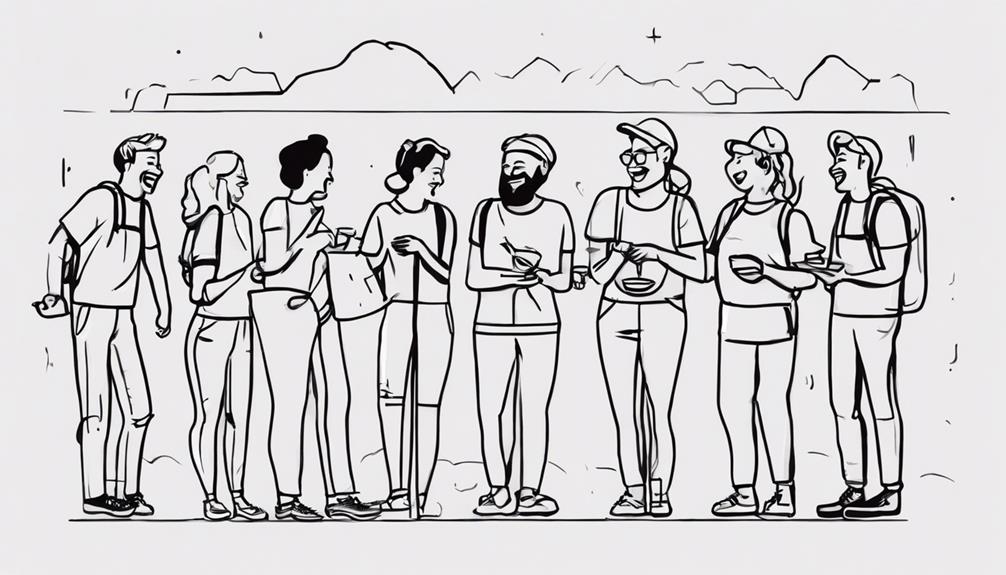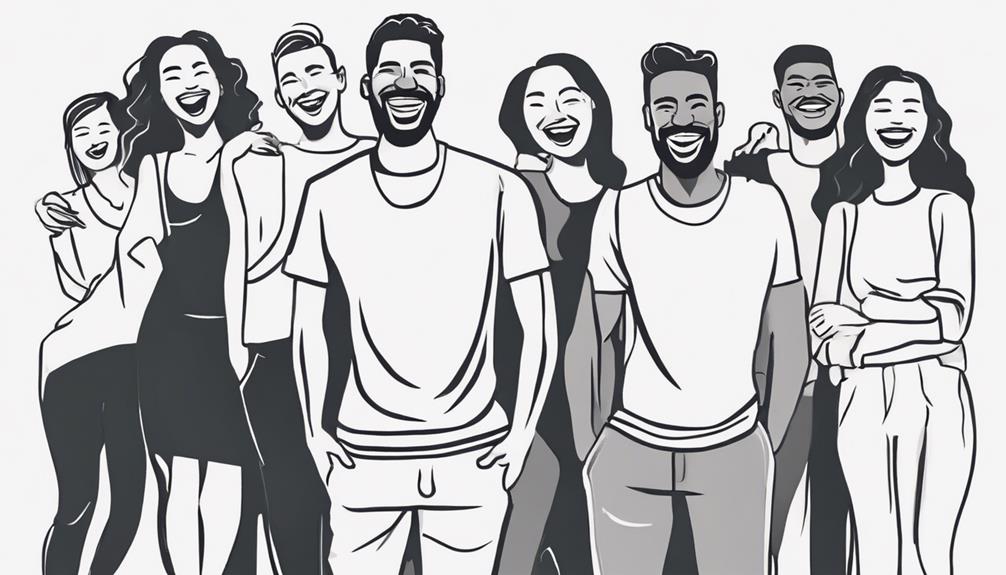Understanding the intricate dynamics of human socialization and the mechanisms behind friendship formation can offer valuable insights into the art of making friends. Research suggests that various factors, including reciprocity, trust-building, and shared experiences, play pivotal roles in establishing and sustaining meaningful connections. By exploring the psychology of friendships, uncovering the impact of social norms, and unraveling the complexities of interpersonal relationships, individuals can navigate the intricate web of social interactions with finesse. As we delve deeper into the nuances of human connection, a profound understanding of the mechanisms governing friendship can illuminate pathways to forging genuine and enduring bonds.
Key Takeaways
- Join clubs or engage in shared activities to build connections.
- Listen actively and communicate regularly to strengthen relationships.
- Be friendly, inclusive, and celebrate differences for deeper bonds.
- Utilize social platforms and online communities to connect with others.
Joining Clubs or Organizations

Engaging in clubs or organizations provides a structured platform for individuals to connect with like-minded peers who share common interests. Joining clubs allows individuals to interact with others who have similar passions, fostering a sense of community and camaraderie. By participating in group activities organized by these clubs, individuals have the opportunity to engage in shared experiences that can lead to the formation of friendships. These connections are often built on a foundation of mutual interests and can develop into meaningful relationships over time.
Clubs and organizations offer a structured environment where individuals can find others who share their enthusiasm for specific hobbies, causes, or activities. Through regular interactions within these groups, individuals have the chance to engage in discussions, events, and projects that not only deepen their understanding of their interests but also create avenues for socializing and forming lasting connections. Joining clubs provides a valuable opportunity to connect with like-minded individuals, fostering relationships that can enrich one's social life and provide a sense of belonging within a community.
Showing Friendliness
Demonstrating friendliness through welcoming gestures and open body language is essential in establishing initial connections with potential friends. To exhibit friendliness effectively, consider the following:
- Welcoming Gestures: A simple smile, a nod, or a warm greeting can go a long way in making others feel comfortable and open to interaction.
- Approachability: Being approachable entails being open to conversations and showing interest in others. Make yourself available and receptive to engage with those around you.
- Kindness and Empathy: Displaying kindness and empathy towards others can create a sense of understanding and connection, laying the foundation for meaningful relationships.
- Reflecting on Desired Qualities: Think about the qualities you value in friends, such as honesty, loyalty, or humor. By embodying these traits, you can attract like-minded individuals and nurture lasting friendships.
Being a Good Listener

Understanding the importance of active listening is crucial in fostering strong and meaningful friendships. Active listening involves more than just hearing; it requires showing empathy and understanding the speaker's perspective. By listening attentively, friends can build trust and strengthen their bond. It is essential to refrain from interrupting or preparing responses while the other person is speaking, as this demonstrates a lack of active listening. Reflecting on the speaker's words and asking clarifying questions not only shows genuine interest but also enhances engagement in the conversation. Friends who practice active listening create a space where each person feels valued and understood, paving the way for deeper connections. Through active listening, individuals can nurture friendships based on mutual respect and empathy, laying the foundation for long-lasting and fulfilling relationships.
Creating Friendships With Mutual Connections
Utilizing mutual connections can significantly facilitate the establishment of new friendships by providing a shared platform for initial introductions and fostering common ground. When looking to create friendships through mutual connections, consider the following:
- Leverage Shared Acquaintances: Shared acquaintances can serve as valuable intermediaries, introducing individuals and initiating the first interactions.
- Identify Common Ground and Shared Interests: Mutual connections often indicate shared interests or backgrounds, which can lay a strong foundation for building new friendships.
- Tap into Existing Relationships: Utilize existing relationships to expand your social circles and meet new people through trusted connections.
- Access Social Support and Expand Social Circles: Mutual connections not only aid in forming friendships but also provide a support network and opportunities to widen your social circle.
Maintaining Communication

Effective communication is essential for nurturing and sustaining meaningful friendships. Regular communication plays a vital role in strengthening connections and ensuring the longevity of relationships. Initiating contact through various means such as calls, messages, or meet-ups is crucial to demonstrate your interest in staying connected with your friends. Consistent communication is key in preventing misunderstandings and conflicts, as it conveys mutual value and respect. Sharing updates, thoughts, and feelings on a regular basis fosters a sense of closeness and intimacy, deepening the bond between friends. By staying connected proactively, you not only show your commitment to the friendship but also nurture the relationship for the long term. Maintaining communication helps in building trust, understanding, and support within friendships, creating a solid foundation for mutual growth and companionship. It is through regular and meaningful interactions that friendships flourish and withstand the tests of time.
Being Open to Opportunities
To cultivate new relationships, individuals must actively seek out and embrace novel experiences, seizing social opportunities that come their way. By being open to unexpected responses and saying yes to invitations, one can expand their social circle and create meaningful connections. It is crucial to acknowledge the value each person brings to friendships and be present and engaged in social settings to foster genuine interactions.
Embrace New Experiences
Embracing new experiences is a catalyst for expanding social circles and fostering diverse connections. Engaging in different activities and stepping out of your comfort zone can lead to meeting a variety of individuals and broadening your social network. Here are some benefits of embracing new experiences:
- Meeting diverse individuals and expanding social circles.
- Creating potential friendships and shared memories.
- Strengthening bonds through shared experiences.
- Sparking interesting conversations and forming connections.
Seize Social Chances
Remaining receptive to unexpected social opportunities enhances one's ability to cultivate new connections and expand their social network. To make friends, one must seize chances to engage in conversations, join activities, and meet new people. Embracing invitations to events facilitates interactions with others and opens doors to potential friendships. By staying receptive to spontaneous social opportunities, individuals increase their chances of forming meaningful connections. Taking the initiative to interact with others in various settings can lead to the development of lasting relationships. It is essential to be proactive in seeking out social chances and being open to new experiences. Engaging with different individuals and groups can enrich one's social life and create avenues for building strong friendships.
| Seize Social Chances | Benefits of Being Open |
|---|---|
| Engage in conversations | Develop communication skills |
| Join activities | Discover shared interests |
| Meet new people | Expand social network |
Boosting Self-Confidence

Boosting self-confidence is a fundamental aspect of fostering strong and meaningful friendships. When you enhance your self-assurance, you are better equipped to navigate social interactions and establish connections. Here are some key ways in which boosting self-confidence can positively impact your ability to make friends:
- Approach New People: Increased self-confidence enables you to approach new individuals with a sense of assurance and openness, making it easier to initiate conversations and form new friendships.
- Attract Like-Minded Individuals: Confidence in yourself can act as a magnet for like-minded individuals who appreciate your self-assuredness and are drawn to your positive energy.
- Set Healthy Boundaries: With a strong sense of self-confidence, you are more likely to establish and maintain healthy boundaries in your friendships, ensuring mutual respect and understanding.
- Communicate Effectively: Cultivating self-confidence can improve your communication skills, allowing you to express yourself authentically and assertively in friendships, leading to more meaningful and fulfilling relationships. Boosting self-confidence not only enhances your well-being but also makes you a more desirable friend.
Embracing Differences
Diversity in perspectives and backgrounds plays a crucial role in fostering deeper connections and enhancing the fabric of friendships. Embracing differences allows individuals to appreciate diverse viewpoints, leading to a more profound understanding of others. To foster connections, it is essential to avoid assumptions and judgments based on cultural backgrounds or beliefs. Instead, one should focus on building relationships grounded in mutual respect and understanding. By valuing diversity and unique experiences, individuals can learn from one another and broaden their horizons.
In friendship, the richness that diverse perspectives bring should be acknowledged and celebrated. Each person offers a unique set of experiences and insights that contribute to the tapestry of relationships. Embracing these differences not only enriches friendships but also creates a more inclusive and harmonious social environment. By actively seeking to learn from others and appreciating the value they bring, individuals can forge deeper connections that transcend superficial differences. Therefore, embracing diversity is key to building meaningful and lasting friendships.
Utilizing Online and Social Platforms

Utilizing online and social platforms has become increasingly prevalent in modern society as a means to expand social interactions and connect with like-minded individuals virtually. This digital landscape offers a plethora of opportunities for individuals seeking to make new friends or expand their social circles. Here are some effective ways to utilize online platforms for friendship-building:
- Engage in online activities and discussions: Participating in online discussions and activities tailored to your interests can help you connect with individuals who share similar passions.
- Participate in digital events and forums: Joining digital events and forums allows you to interact with a diverse group of people, fostering new connections and social interactions.
- Utilize online platforms to join virtual communities: Online platforms provide access to virtual communities where you can engage with like-minded individuals, share experiences, and develop meaningful relationships.
- Connect with potential friends through social media: Social media platforms offer a convenient way to connect with potential friends, explore common interests, and initiate friendships in a digital environment.
Frequently Asked Questions
How Do You Actually Make Friends?
Making friends involves joining clubs, attending events, and participating in volunteer opportunities to connect with like-minded individuals. Starting conversations, being open-minded, and showing kindness are essential in building relationships. Sharing interests, attending meetups, and being authentic help establish connections. Following up and nurturing these friendships over time is key to developing lasting relationships. By engaging in these activities and behaviors, one can successfully make friends and expand their social circle.
What Are 5 Ways to Make Friends?
To develop connections and foster friendships, engaging in activities that align with personal interests, participating in volunteer opportunities, attending social gatherings, initiating conversations, asking thoughtful questions, sharing common interests, showcasing approachability, displaying kindness, maintaining an open-minded attitude, and radiating positivity are key. These strategies contribute to the establishment of meaningful relationships and the cultivation of a supportive social network.
Why Do I Feel Like I Can't Make Friends?
Feeling unable to make friends can result from a multitude of factors such as social anxiety, fear of rejection, low self-esteem, trust issues, communication skills deficits, past negative experiences, feelings of isolation, and overthinking social situations. These issues can manifest as a lack of confidence, introverted tendencies, and a general feeling of inadequacy. Addressing these underlying challenges through self-reflection, therapy, and skill-building can help improve social interactions and foster potential friendships.
How Do I Get a Social Life?
To cultivate a social life, engage with various avenues such as joining clubs, attending events, volunteering, participating in meetups, networking, joining sports teams, hobby groups, book clubs, leveraging work connections, and utilizing social media. These activities enable exposure to diverse individuals with shared interests, fostering the development of social connections. By actively participating in these opportunities, individuals can expand their social circles and enhance their social lives significantly.
Conclusion
In the intricate tapestry of human relationships, the art of making friends is akin to planting seeds in a vast garden. By sowing the seeds of genuine conversations, shared interests, and acts of kindness, individuals nurture the growth of meaningful connections. Through intentional efforts, active listening, and embracing diversity, the bonds of friendship blossom and flourish. With patience, perseverance, and an open heart, the garden of friendships blooms with beauty and resilience.
